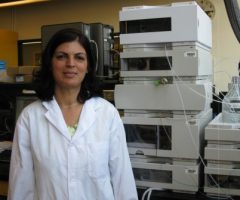
Farah Hosseinian
Associate Professor
Department of Chemistry (Food Science) and
Institute of Biochemistry
Bio:
| 2013-present | Associate Professor, Food Science, Department of Chemistry and Institute of Biochemistry, Carleton University, ON |
| 2009-2013 | Assistant Professor, Food Science, Department of Chemistry and Institute of Biochemistry, Carleton University, ON |
| 2008–2009 | Postdoctoral Fellow (NSERC), Agriculture & Agri-Food Canada, Pacific Agri-Food Research Centre, Summerland, BC |
| 2007-2008 | Postdoctoral Fellow, Department of Food Science, University of Manitoba |
| 2000-2002 | Research Assistant, Agriculture and Agri-Food Canada, Saskatoon, Saskatchewan |
| 2006 | PhD, Pharmaceutical Science, University of Saskatchewan. |
| 2000 | MSc, Food Science, University of Saskatchewan. |
| 1986 | BSc, Food Science, University of Mashhad, Iran |
1. What is your area of interest/research?
My research program is on Food Processing/Food Functionality, focusing on extraction and characterization of novel biomolecules (phytochemical, mainly phenolic lipids) from agri-food by-products/waste. I also study their structure-function relationship in microemulsions/encapsulations in food and biological membranes. These biomolecules can have considerable potential for Food Science, Agriculture, Cosmetic, Pharmaceutical, Animal Science and Health Science applications. Our lab is now more than 90% solvent free with innovative green techniques (SC-CO2 and Ultrasound) used to extract biomolecules. Using green technology and reducing waste is important for the environment. I love working with the Food Industry, helping them solve food production or quality problems.
2. What drew you to Food Science? What excites you about it?
My experience with food industry during my undergraduate degree in food science led me to start my education and carrier in food science, focusing on food processing/food technology improving food functionality.
3. Why is it important to society?
Humans eat from birth to death! Food processing is key to provide safe and nutritious food to sustain life and promote good health. Food technology is also really important to world nutrition and closely linked to food processing.
4. What course(s) do you teach? What is your favourite course to teach and why?
I teach three courses. Food processing (FOOD 2002) and Food analysis (FOOD 3002) for undergraduate students, as well as a cross listed Functional Foods & and Natural Health Products/FF (FOOD 4203/5105) for 4th year undergraduate and graduate students. I like both food processing and FF courses because both courses are based on problem solving for the food industry. That is a challenging but really important skill for students to develop.
5. What makes the Food Science program at Carleton University differ from other universities?
Both research and teaching in the Food Science program at CU have a strong link between science, food risk assessment and food regulations that make our food science program very unique. This offers a dept knowledge for students providing applied disciplines/skills with a diverse potential to find jobs both in industry and government.
6. What is a fun fact about you?
My strong relationship with food industry and government helped me create challenging cases for students on food adulteration and industry problem solving while respecting food regulations. It is really FUN!